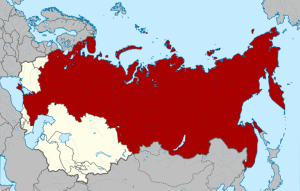Four Things That Make Russian Unique
By Sarah-Claire Jordan
 Russian has the fame of being one of the most difficult languages to learn for people who don’t already speak a Slavic language. Still, some 260 million people speak Russian worldwide, either as a native language or a second language. Russian is in the East Slavic language group, along with Ukrainian and Belarusian. After English, Russian is the second-most used language on the Internet.
Russian has the fame of being one of the most difficult languages to learn for people who don’t already speak a Slavic language. Still, some 260 million people speak Russian worldwide, either as a native language or a second language. Russian is in the East Slavic language group, along with Ukrainian and Belarusian. After English, Russian is the second-most used language on the Internet.
Besides being so difficult to learn, Russian is known for many other things. Here are just a few of them:
1. It is the Slavic language with the highest number of speakers
As mentioned earlier, there are 260 million speakers of Russian all around the world. It can be found in 27 different countries, including the Russian Federation and many Baltic countries. Finland and Norway are two Scandinavian countries where Russian is spoken. Former Soviet republics are home to many Russian speakers as well. Russian places 6th in number of native speakers, and because of this is one of the six official languages of the United Nations.
2. There are several languages that have been derived from Russian
Some of these are argots (secret languages), while others are pidgins or others with a Russian base. Fenya, for example, is a language used by criminals that only other speakers can understand. Runglish, as the name may suggest, is a pidgin of English and Russian origins, with Russenorsk being the same but with Norwegian grammar. Russenorsk is now extinct, but many other pidgin-like languages survive to this day. Padonkaffsky jargon goes along with Fenya in that it is meant to only be understood by those in the know. It was first used in certain Russian Internet communities, but has grown so popular that many people want to learn it.
3. The Cyrillic alphabet has spurred “russification” of computers and software
The Cyrillic alphabet, which is used to write Russian, is very different from the Latin alphabet, which most computers and software are configured to use. This created a problem that needed a solution for the millions of Russian speakers who had access to the Internet and computers and wanted to be able to express themselves without reverting to using the Latin version of their own language’s alphabet. Luckily, “russification” of software and computers soon came to be, and now Russians can choose from different character encoding systems based on what hardware and software they are using.
4. There is very little variation among Russian dialects
Though there are two or three dialect groups of Russian, depending on which linguist you talk to, there are mostly only some surface differences involving phonology and vocabulary. The history of Russia and its centralized government focused in Moscow has a lot to do with it, as this meant the Moscow dialect of Russian was considered the standard dialect of all of Russia. Other factors that made for little dialectal variation include mandatory education and many Russians migrating from rural areas to the city, where they ended up adapting to the dialect spoken there. This doesn’t mean, however, that all Russian dialects sound the same. A few have survived and provide a nice counterbalance to the standardized dialect.
For an overview of our translation expertise, visit our medical and life science translation page.
Category: Foreign Language








